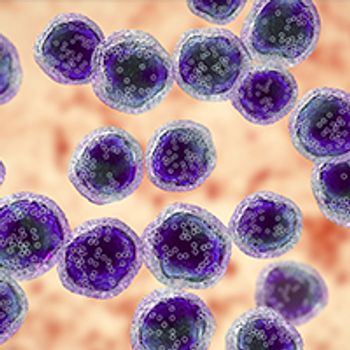
Research of family registries found that individuals with a germline pathogenic ATM variant gene had greater lifetime risk of developing pancreatic cancer than individuals without the gene.

Your AI-Trained Oncology Knowledge Connection!


Research of family registries found that individuals with a germline pathogenic ATM variant gene had greater lifetime risk of developing pancreatic cancer than individuals without the gene.

The FDA granted priority review to 177Lu-PSMA-617 in pretreated metastatic castration-resistant prostate cancer based on positive survival data from the phase 3 VISION study.

Investigators believe that active monitoring presents an alternative option to capecitabine maintenance therapy for patients with stable or responding metastatic colorectal cancer.

The addition of docetaxel did not improve overall survival for patients with nonmetastatic unfavorable-risk prostate cancer, although it reduced incidence rates of radiation therapy-induced cancer.

The association between current human papillomavirus vaccination trends and incidence of oropharynx cancer will be modest over the next 25 years.

A final overall survival analysis found improved results and a tolerable safety profile for patients with advanced IDH1-mutated cholangiocarcinoma who received ivosidenib vs placebo.

Although safety, efficacy, and symptom burden were not statistically different between patients with pulmonary oligometastases treated with single- or multi-fraction stereotactic ablative body radiotherapy, delivery appeared more efficient in the single-fractionation arm.

CancerNetwork speaks with Josh Ludwig on its latest podcast to discuss ScaleReady’s plans to make cell and gene therapy more practical and viable moving forward.

Results from the phase 3 NINJA trial indicated that chemotherapy agents such as gemcitabine or pegylated liposomal doxorubicin yielded better survival outcomes vs nivolumab among patients with platinum-resistant ovarian cancer.

The combination of abiraterone acetate and prednisolone plus androgen deprivation therapy showed a statistically significant improvement in survival outcomes for patients with nonmetastatic high-risk prostate cancer.

An examination of population-based Surveillance, Epidemiology, and End Results registries in Georgia and Louisiana from 2019 to 2020 determined that the diagnosis and treatment of various cancers were delayed due to the COVID-19 pandemic.

Patients with HER2-positive, metastatic biliary tract cancer experienced promising responses and a tolerable safety profile following treatment with pertuzumab plus trastuzumab.

The latest episode of CancerNetwork®’s podcast examines an initiative to diversify patient populations in oncology clinical trials and increase accessibility to these opportunities.

The combination of melflufen plus dexamethasone produced a progression-free survival benefit over pomalidomide plus dexamethasone in patients with transplant-naïve relapsed/refractory multiple myeloma.

A recent study provides evidence showing that focal 22q11.22 deletions may be correlated with poor outcomes in patients with pediatric B-cell acute lymphoblastic leukemia with alterations in IKZF1.

RenovoCath, which was granted a new 510(k) clearance by the FDA, distributes chemotherapy directly to solid tumors via the arteries, opening avenues for a more targeted treatment.

Genomic classifier scores and basal-luminal subtypes may be biomarkers of response for patients with nonmetastatic castration-resistant prostate cancer treated with apalutamide plus androgen deprivation therapy.

Patients with relapsed or refractory multiple myeloma with or without t(11;14) experienced promising responses after being treated with venetoclax plus daratumumab and dexamethasone, as well as venetoclax plus daratumumab, dexamethasone, and bortezomib.

The combination of standard chemoradiotherapy plus avelumab demonstrated clinical activity while maintaining a tolerable safety profile for patients with locally advanced rectal cancer.

Compared with anti-thymocyte globulin, post-transplant cyclophosphamide appears to more successfully prevent graft-versus-host disease in patients with acute lymphoblastic leukemia, resulting in a lower incidence of relapse and improved survival.

Gilles Salles, MD, PhD, and Kami Maddocks, MD, discuss relapsed/refractory diffuse large B-cell lymphoma therapeutic options and important data from the L-MIND trial.

This special episode of “Oncology Peer Review On-The-Go” includes a discussion on relapsed/refractory follicular lymphoma with Javier Munoz, MD, MS, FACP.

Responses to a cross-sectional survey brought to light disparities through important aspects of diagnosing and treating brain metastases.

Low-dose rotational total skin electron beam therapy helped to improve skin-related quality of life and yielded promising responses among patients with mycosis fungoides.

Researchers utilized a ctDNA assay to evaluate minimal residual disease in patients with multiple myeloma post-autologous stem cell transplantation.

Positive preliminary data on FAP-2286 linked to the radionuclide lutetium-177 across a diverse array of adenocarcinomas was reported from the phase 1/2 LuMIERE trial.

Research suggests that perioperative S-1 plus oxaliplatin in patients with gastric cancer who have had a D2 gastrectomy yields a clinically significant improvement over adjuvant capecitabine plus oxaliplatin.

Patients with relapsed/refractory Waldenströms macroglobulinemia benefited from treatment with ixazomib, rituximab, and dexamethasone and maintained a tolerable safety profile.

This special episode of “Oncology Peer Review On-The-Go” features Lee Schwartzberg, MD, FACP discussing treatment patterns in HR-positive breast cancer with.

Black patients with non–small cell lung cancer were more likely to be diagnosed at advanced stages of disease, less likely to receive surgery in early stages, and had increased cancer mortality rates than White patients.